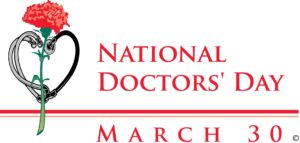 Source: Southern Medical Association Alliance (SMAA)
Source: Southern Medical Association Alliance (SMAA)
The first Doctors’ Day observance was held on March 30, 1933, by the Barrow County Alliance, in Winder, Georgia. The idea of setting aside a day to honor physicians was conceived by Eudora Brown Almond, wife of Dr. Charles B. Almond, and the recognition occurred on the anniversary of the first administration of anesthesia by Dr. Crawford W. Long in Jefferson, Georgia, in 1842. The Alliance immediately adopted the following resolution:
“WHEREAS the Alliance to the Barrow County Medical Society wishes to pay lasting tribute to the Doctors, therefore, be it RESOLVED by the Alliance to the Barrow County Medical that March 30, the day that famous Georgian Dr. Crawford W. Long first used ether anesthesia in surgery, be adopted as “Doctors’ Day,” the object to be the well-being and honor of the profession, its observance demanding some act of kindness, gift or tribute in remembrance of the Doctors.”
This first observance included the mailing of cards to the physicians and their wives, flowers placed on graves of deceased doctors, including Dr. Long, and a formal dinner in the home of Dr. and Mrs. William T. Randolph. After the Barrow County Alliance adopted Mrs. Almond’s resolution to pay tribute to the doctors, the plan was presented to the Georgia State Medical Alliance in 1933 by Mrs. E. R. Harris of Winder, president of the Barrow County Alliance. On May 10, 1934, the resolution was adopted at the annual state meeting in Augusta, Georgia. The resolution was introduced to the Women’s Alliance of the Southern Medical Association at its 29th annual meeting held in St. Louis, Missouri, November 19-22, 1935, by the Alliance president, Mrs. J. Bonar White. Since then, Doctors’ Day has become an integral part of and synonymous with, the Southern Medical Association Alliance.
Through the years the red carnation has been used as the symbol of Doctors’ Day. The analogy of the carnation is closely woven in medical science, so it is only fitting that this flower, so tailored by nature for masculine use with its spicy scent, was chosen as the symbol of Doctor’s Day. The flower – its meaning: Divine-Rejoicing-being said to have appeared on earth for the first time when Christ was born. Crown-coronation-denotes honorary distinction. Its spicy fragrance was used in seasoning dishes “to preserve the body of men, both in mind and spirit.” From the juice of its petals a wine was made “that did comfort the heart of man.”
On March 30, 1958, a Resolution Commemorating Doctors’ Day was adopted by the United States House of Representatives. On August 1, 1989, the SMA Alliance, under the direction of President Mrs. David Thibodeaux, dedicated a bronze marker honoring Mrs. Almond on the grounds of the Court House in Winder, Georgia. In 1990, legislation was introduced in the House and Senate by Congressmen Mike Parker (D- Mississippi) and G. V. Montgomery (D-Mississippi) and Senator Thad Cochran (R-Mississippi) to establish a national Doctors’ Day. Following overwhelming approval by the United States Senate and the House of Representatives, on October 30, 1990, President George Bush signed S.J. RES. #366 (which became Public Law 101-473) designating March 30 as “National Doctors’ Day”:
WHEREAS society owes a debt of gratitude to physicians for the contributions of physicians in enlarging the reservoir of scientific knowledge increasing the number of scientific tools, and expanding the ability of health professionals to use the knowledge and tools effectively in the never ending fight against disease and,
WHEREAS society owes a debt of gratitude to physicians for the sympathy and compassion of physicians in ministering to the sick and in alleviating human suffering: Now, therefore, be it
Resolved by the Senate and House of Representatives of the United States of America in Congress assembled, That;
- March 30, 1991, is designated as “National Doctors’ Day”; and
- the President is authorized and requested to issue a proclamation calling on the people of the United States to observe the day with appropriate programs, ceremonies and
This was the culmination of the efforts of auxilians across the country, led by SMAA Presidents, Mrs. A. J. Campbell and Mrs. Jim Barnett. The enactment of this law enables the citizens of the United States to publicly show appreciation for the role of physicians in caring for the sick, advancing medical knowledge, and promoting good health.

